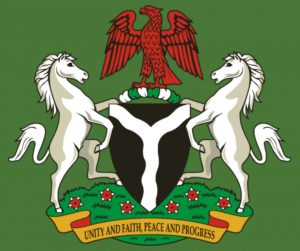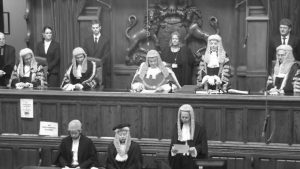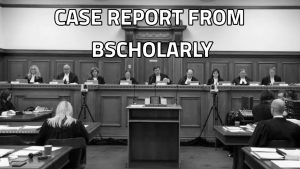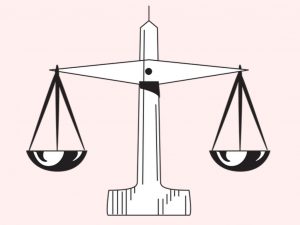Facts, Analysis, Citations, Issues and Judgment in AG Bendel State v AG Federation & 22 ORS (1981): In a federal system of government, the principle of separation of power is one that is operative, with its assistant principle of checks and balances.
The Constitution provides for functions of certain organs and bodies of the Government in the different tiers and it follows in principle that there will be no usurpation of function or power or the creation of a burden on the different organs and bodies by other organs, bodies or tiers.
Certain provisions of the Revenue (Federal Account) of 1981 seemed to defy the above principle, and thus in the case of AG Bendel State v. The AG of the Federation and 22 Ors, these sections were examined and determined by the Court.
Here, the question arose: whether there were times when acts that seem like meddling could be valid.

Recommended: Exceptions to the rule in Rylands v Fletcher
Facts Summary of Attorney General of Bendel State v Attorney General of Federation
In this case, the AG of Bendel State sued the AG of the Federation in the Supreme Court, pursuant to Section 212 of the Constitution of the Federal Republic of Nigeria 1979, providing for the original jurisdiction of the Supreme Court.
The AG of Bendel State challenged certain sections of the Revenue (Federal Account) of 1981 and pleaded the court to declare those sections unconstitutional and void.
According to the Attorney General of Bendel State, because the provisions of Subsection 1 and 2 of Section 2 of the Revenue (Federal Account) of 1981, state that the federal government shall have the power to administer funds to ameliorate ecological problems and to develop mineral producing areas of Nigeria, it ought to be declared unconstitutional and void.

In those sections, it was provided that 1% of the 35% to be allocated to the State Government is to be directed to a fund to be administered by the Federal Government, which fund will be used to ameliorate ecological problems and 1.5% of the 35% to be allocated to the State Government will be paid into another fund to be administered by the Federal Government, which fund will be used to develop mineral producing areas of Nigeria.
Also, the Plaintiff contended that because Subsection 2 of Section 6 provides for the creation of a Joint Local Government Account Allocation Committee in each state, to ensure that allocations made from the Federation Account and from the state are paid to the Local Government Councils, promptly, it ought to be declared void and unconstitutional.

The AG Bendel State also pleaded a declaration that the Government of Bendel State was entitled to the Statement of the Federation Account.
Because of the nature of the case and how its outcome would affect the other States of the Federation, it was directed by the Court that the other 18 States be put on notice so that they will be adequately represented.
Also see: How to sue someone in another country
The first defendant argued that a Federation Account Allocation Committee had been created to ensure that the allocations due to the state were paid on time and in accordance with the formula as provided by the Act and in the Federation Account Allocation Committee, the Bendel State Finance Commissioner is a representative of Bendel State.
It argued that the monthly statement of the Federation Account was examined and confirmed by the Federation Account Allocation Committee every month at a meeting held between the 10th and 15th of each month. This statement is submitted by the Central Bank of Nigeria.
That, the representatives in these Meetings held every month, are given enough opportunity to reject the statement or accept it and ask for clarification on certain entries contained there in.
The defendants also stated that officials of the Central Bank, Inland Revenue Department, Treasury Department and Nigerian Petroleum Corporation were present at these meetings to answer questions that may be had and make clarifications where needed.
The Plaintiff brought a witness, the Deputy Accountant-General of Bendel State to testify to the effect that Bendel State had not been receiving the statement of the Federation Account regularly.

Recommended: Facts Summary, Issues and Judgment in Donoghue v Stevenson
Issues Determined By The Court
1. Whether or not the National Assembly had acted ultra vires by setting aside funds out of the percentage allocated to the state Government to other purposes to be administered by the Federal Government.
2. Whether or not the National Assembly had acted ultra vires by creating the Joint Local Government Account Allocation Committee.
Recommended: Facts, Issues and Decision in Mojekwu v Mojekwu
Decision of the court in AG Bendel State V AG Federation (Attorney General of Bendel State v Attorney General of Federation)
Section 149 of the Constitution of the Federal Republic of Nigeria of 1979 was one of the sections of consideration as it provides that the Federation shall have an account into which revenue is paid; that it shall be distributed among the three tiers of government according to a law enacted by the National Assembly; States shall have an account called the State Joint Local Government Account; the States shall allocate to the local government, funds, as prescribed by the National Assembly; and the State Assemblies shall make laws on how the local Government Funds shall be distributed among the Local Government Councils.
The Counsel to the Plaintiff argued that according to the provisions of the above section, the Federal government could not set aside funds for another purpose other than the distribution of funds amongst the three tiers of government or that it was not within the competence of the National Assembly to allocate the revenue in the Federation account to another purpose. He contended that funds allocated to the Federation can be augmented only from funds paid to the Appropriation Act or other fund as mentioned in Sections 74, 75 and 77 of the Constitution of the Federal Republic of Nigeria, 1979.
He also contended that those provisions exceeded the authority of the President of Nigeria under the Constitution in Section 5.
Counsel to the defendant contended the said provision of Section 149 included that the distribution shall be done in the manner as prescribed by the National Assembly.
The court held that, in the exercise of the power given to the National Assembly by Section 149, the National Assembly should take care not to infringe the powers of the State government.
It stated that there was no part of the said Section 149 that authorized the Federal Government to use revenue already allocated to the State Government on behalf of the State Government.
It held that the State Government became owners of the revenue allocated to them as soon as it was distributed to them and had to have full control to maintain the principle of federalism. It was also stated that the National Assembly did not prescribe the manner in which the funds allocated to the state Government is distributed amongst the States, thus, leaving it within the Federal Government’s discretion and not fulfilling the part of Section 149 of the Constitution that provides that the National Assembly will prescribe the manner of distribution.
It was finally held, in view of these considerations, that the National Assembly acted ultra vires, by setting aside some percentages of the State Government allocation for purposes to be fulfilled and administered by the Federal Government.

While the defendant’s counsel argued that the essence of establishing the Joint Local Government Account Allocation Committee was to supervise the allocation of funds to the local Government and the State, the court in considering the case of Attorney General of Ogun State & Ors. v. Attorney General of the Federation stated that it was general principle the Federal Government could not impose a burden on the State Government and vice versa, including in law making. This is in the spirit of true federalism.
However, there were few exceptions created in the Constitution where the legislative bodies of each state would confer functions on the other Government officials.
Thus, the Federal or state Government, including their law making arms, can derive power from these exceptional enabling powers to make enactments that will include the imposing of duties on the body or Government.
Also see: Functions of the Arms of Government
Conclusively, it was held that the National Assembly in making the Local Government Account Allocation Committee under Section 6 of the Revenue (Federal Account) of 1981 did not act ultra vires and thus, the section was valid.

Edeh Samuel Chukwuemeka, ACMC, is a lawyer and a certified mediator/conciliator in Nigeria. He is also a developer with knowledge in various programming languages. Samuel is determined to leverage his skills in technology, SEO, and legal practice to revolutionize the legal profession worldwide by creating web and mobile applications that simplify legal research. Sam is also passionate about educating and providing valuable information to people.
It was very helpful